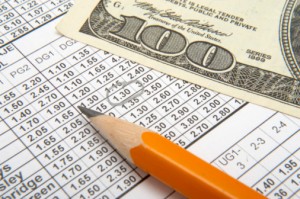This Is What I Call Being Risk-Averse
I found myself in a Las Vegas sports book with good friend and economist John List the other day. Since we both live in Chicago and have kids who play baseball, we thought it would be fun to bet some money on the Chicago White Sox. It would give us a reason to root for the White Sox, and give our kids a reason to open up the morning paper to see if the team had won.
We have no special information about the White Sox, no inside information. It was purely for consumption value.
If the sports book would give us a fair bet, i.e. the equivalent of a 50-50 coin toss, we would be willing to bet a lot because we aren’t very risk averse. I’d say we would have been willing to bet at least $10,000, probably even more.
But, of course, the sports book doesn’t offer fair bets. On the particular bet we were looking at — how many games the White Sox would win over the course of the regular season – the sports book charges about an 8 percent vigorish or commission. We decided that at that price, we were willing to bet $2,500. Eight percent of $2,500 is $200, so essentially we were willing to pay the sports book $200 in expectation to let us place this bet.
So we strolled up to the betting window and said we wanted $2,500 on the White Sox to win more than 84.5 games this year.
The lady behind the counter said the biggest bet we could make was $300.
What?!
We asked her why, and she called over a manager who told us the reason: The casino “didn’t want to take too much risk on this kind of bet.”
This casino is part of Caesars Entertainment, the largest casino company in the world, with annual revenues approaching $10 billion. And they aren’t willing to let us pay them $200 to flip a coin for $2,500?
The next thing you know, the casino will tell me I can’t lay $2,500 on “Black” at the roulette table. After all, it is essentially the same gamble as our White Sox bet … a coin toss in which the casino gets better than fair odds.
This seems like a crazy way to run a business. It is especially surprising because Caesars is one of the few big businesses run by an economist, Gary Loveman, who has brought good economic thinking to many other aspects of the company’s operations.
If I weren’t an economist, running a sports book would be a pretty good job. I wonder if Caesars is accepting resumes?
(For more on sports betting at Caesars and in general, see this column we wrote for The New York Times a few years back.)


Comments